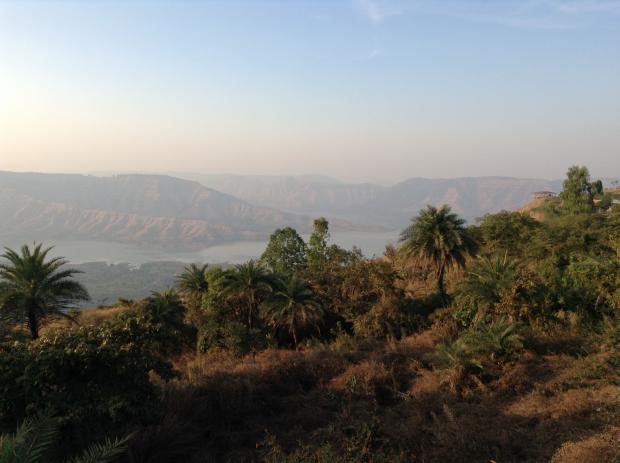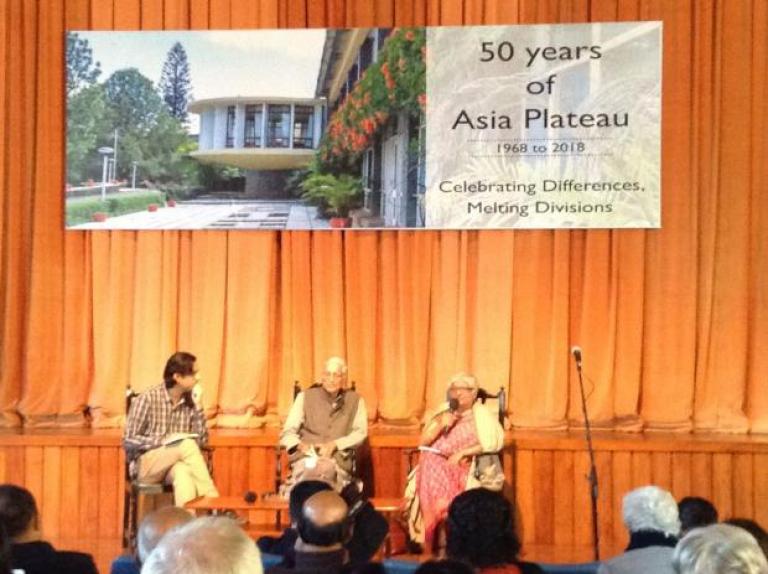How It All Began
The approach to Panchgani winds uphill, as the town wraps round the side of Asia’s second-largest plateau (the Tibetan plateau is largest), overlooking the blue waters of Dhom Dam far below. Roadside stalls display Panchgani’s famous strawberries in neatly-stacked pyramids, and little shops sell roasted, spicy chickpeas. With its pleasant climate year-round, the area is a popular destination for domestic tourists and hosts many boarding schools; rock musician Freddie Mercury went to school here in the 1950s.
Moral Rearmament (MRA), the precursor to Initiatives of Change, held its first youth training programme here in 1964 for youth from all over India. Their course covered material that is still core to IofC today: finding a purpose in life; changing one’s attitudes and setting right personal relationships; learning how to work together for change in the world. At the close of the 10-day programme, the young participants organized an evening to share what they had learned with the town residents.
Whatever they said on that long-ago occasion, clearly it made an impression on their audience. Following that evening, a group of local residents approached the organizers - historian Rajmohan Gandhi, grandson of the Mahatma, and the publisher Russi Lala – inviting them to set up a permanent centre in their town to continue with this type of training.
‘The organizers liked the idea, but weren’t quite ready yet,’ recalled MRA volunteer David Young, a Briton and war veteran who grew up in India. ‘Two years later, they asked my wife and me to inform the citizens of Panchgani that they’d like to take up their request, and to get their help in starting a centre here.’
Revisiting Asia Plateau's Legacy

Young, who is now 96, offered his reflections at the opening of the 50th anniversary celebrations of Asia Plateau, the MRA/IofC centre in Panchgani. More than 300 guests came from over 41 countries, and most stayed for the five-day conference – a time of music, laughter, and memories.
For many, the occasion was a reunion of old friends who had worked together on the MRA traveling musical revues in the 1960s and ‘70s, catching trains, planes and automobiles across the subcontinent to bring their message of peace to cities and rural towns. Guests who knew Asia Plateau in the past expressed how moved they were to find the gardens bright and blooming, the surrounding land reforested by the work of many hands.
The site, when first acquired, was barren, with a lone tree on a hilltop. “People came forward to help,” Young recalled. One of the first to make a financial contribution was a widow in Pune whose daughter had benefited from one of the early training programmes. Another contribution came from Australian architect Gordon Brown, who offered his services to plan the centre at his own expense. Construction began in 1967, and the first of the buildings opened the following year. Stories were told of the old days, of spotting a leopard or a tiger, of staying up all night to hang curtains before the centre opening, of sleeping on school desks pushed together before the building was complete.
Since its opening in 1968, Asia Plateau has hosted thousands of visitors. They come to participate in courses on ethics, values and peace building, and to take part in conferences on the pressing issues of the day: senior civil servants; business executives, political leaders, students and volunteers – even, twice, the Dalai Lama.
Many who came to the 50th anniversary told of personal epiphanies that had resulted from applying the values of honesty, unselfishness, integrity and love in their own lives. Amidst union troubles, an employer sought out an ailing worker and paid for his medical treatment. A senior civil servant recounted his experience of establishing a ‘Department of Happiness’ in the State of Madhya Pradesh, drawing on his experiences with IofC. From Northeast India, young people who had experienced the bitterness of discrimination gave accounts of their own healing from previous desire for revenge. Rural people shared their experiences of transformation and growth through the outreach and rural development activities undertaken through Asia Plateau’s ‘Grampari’ project.
The Future: Creating a Humane Society

Looking ahead, speakers stressed the need to reconsider what IofC can offer the world today. In a session with Rajmohan Gandhi, journalist Neerja Chowdhury suggested that Asia Plateau has a role to play in creating a humane society, through supporting and enabling alternative approaches. Gandhi urged all participants to ‘know your neighbour’s story’ as the first step toward the humane society.
Other guest speakers represented the ongoing need for peace and trust building around the world. Imam Muhammad Ashafa and Pastor James Wuye, from northern Nigeria, spoke of their experiences since the 2006 film that depicted their reconciliation after years of violence, in which James lost his hand and Ashafa’s brothers and teachers were killed. The two now work together to mediate between Christians and Muslims, and have plans to build a centre that can be a base for continuing their work.
Drawing on these experiences, participants at the 50th anniversary conference sought to balance the dynamic between ‘packaging’ the work of IofC in the form of films, publications and resource material to reach wider audiences, while acknowledging that building relationships and trust takes time and human effort; in the words of one participant, ‘Getting to know one’s neighbours can’t be done by getting straight to the point every time!’
The conference also saw the launch of IofC’s refreshed logo and branding. Imad Karam, President of IofC International, welcomed the new look as an expression of IofC’s shared global identity, and called on all guests to ‘do more to speak to the world out there.’ Omnia Marzouk, former President of IofC International, encouraged all concerned to be idealistic but practical in the face of xenophobia and ‘exclusive nationalism.’ Concluding the event, Young noted that, at the end of the day, ‘The great value of Asia Plateau is that it doesn’t stay here…it goes out around the world.’ - Delia Paul
- The 50th anniversary celebration and conference at Asia Plateau took place from 17-21 January 2018. For more information about happenings at Asia Plateau, see the calendar and browse the IofC India website.

